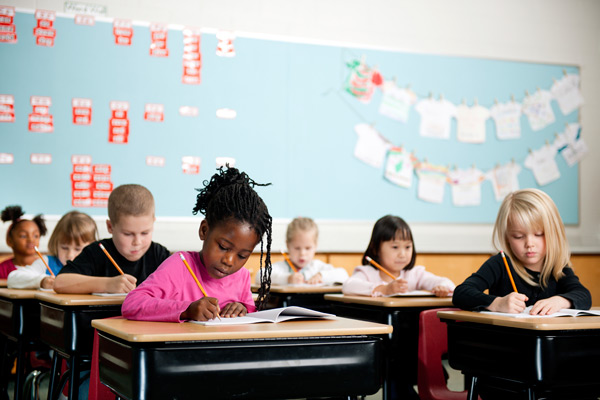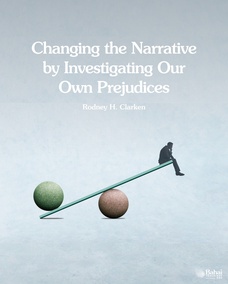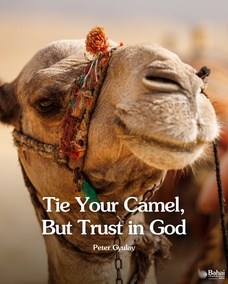The views expressed in our content reflect individual perspectives and do not represent the authoritative views of the Baha'i Faith.
O God, guide me, protect me, make of me a shining lamp and a brilliant star. Thou art the Mighty and the Powerful. – Abdu’l-Baha, Baha’i Prayers, p. 37.
 As a father, I taught my sons to sing this Baha’i children’s prayer to the tune of the English folk song, “Early One Morning.” I loved hearing them sing it. Can anything, or anyone, be more precious than your own children? How about other children? Aren’t they equally precious?
As a father, I taught my sons to sing this Baha’i children’s prayer to the tune of the English folk song, “Early One Morning.” I loved hearing them sing it. Can anything, or anyone, be more precious than your own children? How about other children? Aren’t they equally precious?
How best to nurture them? To protect them? To educate them? To guide them? To make them as wise as they are innocent? Every parent struggles with these important questions.
That’s why children’s classes have become one of the “core activities” in the Baha’i world today, and that’s the focus of Book 3 in the “Ruhi Institute” sequence of study circles.
Not all Baha’is teach children’s classes, but all Baha’is are encouraged to learn about and support children’s classes by studying Book 3. It’s not required. But each and every Baha’i community tries to hold children’s classes—because the future of the world depends on children.
You don’t have to be a Baha’i to participate in this worthwhile, worldwide endeavor. We can all help. We can teach children universal spiritual principles, morals and manners, virtues and perfections, and, later on, arts and crafts, science and religion, and so forth. We can all help all children have hope for the future:
Exert every effort to acquire the various branches of knowledge and true understanding. Strain every nerve to achieve both material and spiritual accomplishments.
Encourage the children from their earliest years to master every kind of learning, and make them eager to become skilled in every art—the aim being that through the favouring grace of God, the heart of each one may become even as a mirror disclosing the secrets of the universe, penetrating the innermost reality of all things; and that each may earn world-wide fame in all branches of knowledge, science and the arts.
Certainly, certainly, neglect not the education of the children. Rear them to be possessed of spiritual qualities, and be assured of the gifts and favours of the Lord. – Abdu’l-Baha, A Compilation on Baha’i Education, pp. 19–20.
This is a very high standard, indeed. The message behind the exhortation that “each may earn world-wide fame in all branches of knowledge, science and the arts” is simply a call for excellence in the path of service to humanity. This is applied altruism.
Here, fame is a means to an end, not an end in itself. The discoverer of a scientific breakthrough can and should be honored. But the discovery itself, if of benefit to the world, is the real cause for recognition and rejoicing. Baha’is believe that scientific knowledge and nobility of character go hand-in-hand.
To meet these lofty goals, we need practical advice. The education of children, as the saying goes, “takes a village.” In other words, we need the collaboration of parents, professionals, peers, and other participants to make children’s education the best that it can possibly be.
In Ruhi Book 3, participants “learn to teach simple children’s classes consisting of memorization of prayers and quotations, songs, stories, games and coloring.” Simple as that! Anyone can do it. As a practical measure, the book offers “15 Lessons for Children.” Take “Lesson 9,” for instance, which includes this song:
Prefer Your Brother
Chorus:
It is a blessing to prefer your brother.
This is a way to show you care.
It is a blessing to prefer your sister.
You are richer, the more you share.
I am thirsty, I am thirsty,
But my brother, he comes first.
So I offer him the water
That will quench his thirst
Chorus
I am hungry, I am hungry,
And my sister, she is too.
So I give her some of my food,
That’s what’s best to do.
Simply remarkable! What virtue! What compassion! What nobility!
In “Conducting Classes for Children,” the stated purpose is simply this: To develop the skills and abilities needed to conduct classes for children, managing the class with a great deal of love and understanding and, at the same time, with the discipline necessary to create a proper learning environment.
You get the idea.
So how many Baha’i communities around the world offer children’s classes? Every single one of them! (At least that’s the goal.) The larger Baha’i communities conduct various children’s classes in different neighborhoods. The result? Baha’is today, worldwide, offer literally thousands of free children’s classes.
Your children do not need to be Baha’is to participate. Yes, references to Baha’i teachings inform these simple lessons. But the emphasis stays on the spiritual teachings themselves, not their source. That’s because the purpose of the Baha’i Faith is not to convert, but to transform.
Of course, Baha’is love to see their communities grow. But, for a Baha’i community to be worth its salt, the Baha’is themselves must strive to become the “salt of the earth.” If we all come together to dedicate a few hours in a week or month to the spiritual education of our precious children, each one of them may become “a shining lamp and a brilliant star.”











![[God] hath made woman and man to abide with each other in the closest companionship, and to be even as a single soul. They are two helpmates, two intimate friends, who should be concerned about the welfare of each other. If they live thus, they will pass through this world with perfect contentment, bliss, and peace of heart, and become the object of divine grace and favour in the Kingdom of heaven. But if they do other than this, they will live out their lives in great bitterness, longing at every moment for death, and will be shamefaced in the heavenly realm. Strive, then, to abide, heart and soul, with each other as two doves in the nest, for this is to be blessed in both worlds. – #AbdulBaha #Love #Marriage #Companionship #BahaiFaith
(Selections from the Writings of ‘Abdu’l-Bahá, paragraphs 92.1–92.3)](https://media.bahaiteachings.org/sb-instagram-feed-images/487782836_18497319871023335_4819806972653811469_n__v284x284__.jpeg)




Comments
Sign in or create an account
Continue with Googleor